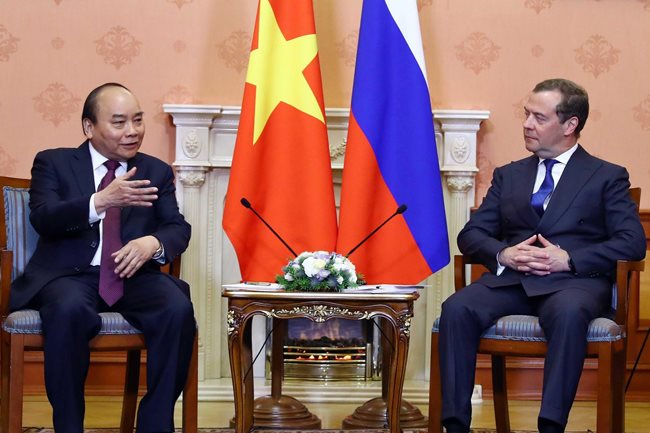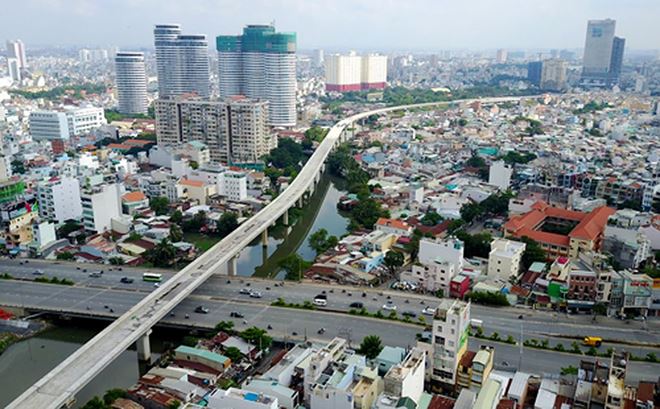
Vietnamese Prime Minister Nguyen Xuan Phuc (L) and his Russian counterpart Dmitry Medvedev at a meeting in Moscow, Russia, on May 22. (Photo: VNA)
Their talks were part of the Vietnamese leader’s activities during his official visit to Russia from May 21 to 23 at the invitation of Russian Prime Minister Dmitri Medvedev, reported the Vietnam News Agency.
The host welcomed PM Phuc’s visit, noting that Russia wishes to strengthen the countries’ comprehensive strategic partnership. In return, PM Phuc said that Vietnam treasures its traditional cooperation and friendship with Russia.
The two leaders acknowledged the significance of organizing the Vietnam Year in Russia and the Russia Year in Vietnam in 2019 and 2020, respectively, describing these as major events to strengthen bilateral ties and add a fresh impetus for cooperation.
Political relations have been strengthened with frequent mutual visits and meetings at all levels and through all channels, according to the leaders.
They said with satisfaction that as a result of the free trade agreement between Vietnam and the Eurasian Economic Union, which came into force in 2016, Vietnam-Russia trade and investment ties have seen strong progress as bilateral trade hit US$4.57 billion in 2018, marking a year-on-year rise of 28.6%.
To further tap into their trade cooperation potential, the two sides pledged to create favorable conditions for their businesses and for goods to enter each other’s markets.
The leaders confirmed that energy is a key pillar of Vietnam-Russia ties. They agreed to boost business cooperation in oil and gas exploration and exploitation on Vietnam’s continental shelf and in Russian territory.
They shared the view that despite many projects being proposed or executed, there is still room for a bilateral investment partnership. They welcomed Vietnamese and Russian firms’ focus on collaboration in developing urban transport and railway infrastructure in Vietnam.
They were also committed to accelerating the construction of a research center for nuclear science and technology in the Southeast Asian nation.
The leaders spoke highly of the important outcomes of bilateral defense and security cooperation, which has contributed to enhancing strategic trust between the two countries, while agreeing to expand cooperation in other potential fields, such as science and technology, education and training, culture, sports and tourism.
They also voiced their support for direct relations between Vietnamese and Russian localities, which will help diversify the all-round cooperation. Some measures were also devised to bolster labor cooperation, a potential area that suits demand on both sides.
PM Phuc took this occasion to thank Russian leaders and the concerned agencies for creating conditions for Vietnamese people to live, study and do business in the country.
At the talks, the PMs also exchanged views on regional and international issues of mutual concern, including the maintenance of peace, stability, security, safety and freedom of navigation and aviation in the Asia-Pacific region, including the East Sea.
After the talks, the two PMs witnessed the signing of 14 cooperation agreements on nuclear energy, oil and gas, construction, tourism, judicial and locality-to-locality cooperation and so on, and co-chaired a joint press conference.

HCM City’s metro line No 1 is being built between Ben Thanh Market in District 1 and Suoi Tien Tourist Park in District 9.
Nguyen Thanh Phong, Chairman of the municipal People’s Committee, said challenges like traffic problems and flooding have been acting as road blocks to economic development and competitiveness.
Insufficient resources for infrastructure development are one of the major reasons for these hindrances, he said.
In particular, HCMC requires some VND 924 trillion (about $42 billion) for 85 transport infrastructure projects, including 55 roads and bridges, 7 ones for waterway transport, 8 railway and 15 road works.
Besides, the Southern city requires $833 million worth of private investment in its metro line projects, including the sections of line No 2 between Ben Thanh Market and Thu Thiem and between Tham Luong and Tay Ninh Bus Terminal.
Meanwhile, the metro line No 3A from Ben Thanh Market to Tan Kien Terminal in Binh Chanh district and running through several districts will cost $3.02 billion.
Metro line No 3B from Cong Hoa Crossroads to Hiep Binh Chanh will require $1.88 billion. Line No 4 between the Thanh Xuan and Hiep Phuoc urban areas will also run through multiple districts and cost $3.53 billion. And line No 4B between Gia Dinh Park in Binh Thanh district and Lang Cha Ca Terminal in Go Vap district needs $1.33 billion.
All of them will be built in public-private partnership (PPP) mode, and the city has yet to tie up private funding for them.
Their construction has been entrusted to the HCM City’s Management Authority for Urban Railways (MAUR), which also plans to manage the construction of the monorail lines No 2 and 3.
In addition, HCMC has also solicited investment in the 27.2km line No 2 which is expected to cost $715 million and also be built in PPP mode. Meanwhile, the 12.8km line No 1 will cost $658 million.
HCMC’s requirement to fund a total of 210 infrastructure projects offers local and foreign investors a lot of business opportunities. Various realty firms hope to take part in the city’s transport infrastructure, urban infrastructure, urban renovation, and business-related services projects.
The city government would create favourable conditions for enterprises to function efficiently and secure their rightful benefits, Mr Phong affirmed.
Vietnam-Russia trade ties could reach US$10 billion by 2020If nontariff barriers on major commodities are removed and a bilateral payment channel using local currencies is launched, the bilateral trade between Vietnam and Russia could amount to US$10 billion by 2020, said PM Phuc at the Vietnam-Russia Business Forum. Held in Moscow on May 22, the forum was aimed at seeking better, more effective and timely measures to ensure that bilateral cooperation boosts Vietnam-Russia relations. PM Phuc gave participants insights into Vietnam’s socioeconomic achievements after more than 30 years of economic reforms. Phuc pointed out the need to boost trade and tourism investment between Vietnam and Russia, particularly in areas such as e-governments, smart cities, the digital economy and other areas of mutual benefit. Vietnam is now the 23rd largest trade partner of Russia and is running 20 projects worth US$3 billion in the country, while Russia has 123 projects operational in Vietnam, excluding those related to oil and gas, totaling US$1 billion. Meanwhile, Russian Deputy Prime Minister Maxim Akimov remarked that Vietnam has confirmed itself as a key partner of Russia in Southeast Asia as it accounts for one-third of Russia’s imports from countries in the region. Vietnam is also the first nation in Southeast Asia and the world to sign a free trade pact with the Eurasian Economic Union, added the Russian leader. He suggested that both sides foster cooperation in technology, stressing that Russia is willing to support Vietnam in the fields of digital government and smart city development as well as cybersecurity. |


















